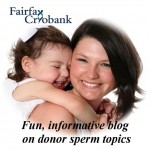Genetic FAQs
What are the genetic disease tests performed on the donors?
It is essential to have a comprehensive understanding of genetic conditions and genetic inheritance in order to provide the best possible donor screening for inherited conditions. Fairfax Cryobank provides the expertise of board-certified clinical geneticists in evaluation of the donor’s medical and family history as well as reviewing the test results of the extensive genetic screening performed on all sperm donor applicants. Any applicant with a family history that places him at higher than normal risk of transmitting a genetic condition is rejected.
Any candidate that is identified as a carrier or exhibits evidence of any of these diseases is not accepted into the donor program.
All Donors:
- Chromosome Analysis (karyotype)
- Cystic Fibrosis (at least 86 mutations)
- Hemoglobin Electrophoresis
All New Donors since June 2008
- Spinal Muscular Atrophy (SMA). Donors with SMA testing are indicated on their medical profiles as being tested. Please contact Client Services by phone (800-338-8407) or email for a list of tested donors.
Donor of Ashkenazi Jewish ancestry:
- Tay Sachs disease
- Canavan disease
- Gaucher disease
- Bloom syndrome
- Fanconi-Amemia Type-C
- Niemann-Pick Type A
- Mucolipidosis Type IV
- Familial Dysautonomia
Also added since 9/2010:
- Maple Syrup Urine Type 1B
- ABCC8-Related Hyperinsulinism
- Usher Syndrome Type-IF and Type-III
- Glycogen Storage Disease Type-1A
- Lipoamide Dehydrogenase Deficiency
Donors of French Canadian Ancestry:
- Tay Sachs disease
Donors of Irish Ancestry (began testing in 6/2008)
- Tay Sachs disease
Donors of Asian, Middle Eastern or Mediterranean Ancestry:
- Thalassemia
Donors of African, Black American Ancestry:
- Sickle Cell disease and other hemoglobinopathies
* Fairfax Cryobank screens all donors regardless of ethnicity for the presence of both hemoglobin S and C trait.
Click here for a detailed description of these genetic diseases.
What kinds of genetic issues are screened for in the donor’s health history?
All donors will have a three-generation family history reviewed by a geneticist. The family history will present information on illnesses and birth defects noted in the individual family members, causes of death, history of miscarriage or reproductive failure, and any known hereditary disorder. Any donor at an increased risk for a genetic or hereditary disorder above that expected in the general population, will be excluded. Examples of disorders that would exclude a donor include alcoholism in a first degree relative, a sibling with spina bifida, a donor with a medical condition such as a heart defect or diabetes, and mental illness or mental retardation in a first degree relative.
Does the normal chromosome analysis on the donor tell me he has no genetic problems?
A chromosome study looks at the whole structure of the chromosome, detecting changes in chromosome structure. It does not look at the level of the genes, which make up the chromosomes like beads on a string. Thousands of genes make up every chromosome. A normal chromosome analysis tells us that no obvious chromosomal defects were found but does not tell us that the genes that make up those chromosomes are indeed normal. Individuals with abnormal chromosome structure (chromosomal rearrangements) are at increased risk for reproductive failure and having children with significant birth defects. They would be excluded from the donor register.








